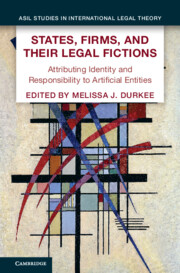 States, Firms, and Their Legal Fictions
States, Firms, and Their Legal Fictions Origins and Implications
from Part IV - Conceptual Origins and Lineages
Published online by Cambridge University Press: 29 February 2024
As increasingly recognized, medieval and early modern corporations were influential models for the emerging European state. E E xisting scholarship documents the influence of the corporation’s constitutionalism on the constitutionalism of the state. T T his article documents the separate influence of the corporation in imparting “juridical personhood” to the state – —the capacity to own and contract as an individual. T T his is a feature of all modern states, regardless of constitutional order, that vastly augments their power and makes possible the current international state system. C C ontrary to reigning assumptions, it did not automatically follow from borrowing the corporation’s constitutional structure, but was a distinct historical development. J J uridical personhood passed from the (corporate) bishopric to the kingdoms of Europe via the medieval bishop–~king analogy. T T he chapter examines this history in England and the Continent, then relates how the American founders resolved the longstanding tension between state sovereignty and state juridicality, i.e.that is, that the state is sovereign yet is under the rule of law and, for example, bound by its contracts. T T he chapter also clears up some modern conceptual confusions regarding peoples, states, and governments.
To save this book to your Kindle, first ensure no-reply@cambridge.org is added to your Approved Personal Document E-mail List under your Personal Document Settings on the Manage Your Content and Devices page of your Amazon account. Then enter the ‘name’ part of your Kindle email address below. Find out more about saving to your Kindle.
Note you can select to save to either the @free.kindle.com or @kindle.com variations. ‘@free.kindle.com’ emails are free but can only be saved to your device when it is connected to wi-fi. ‘@kindle.com’ emails can be delivered even when you are not connected to wi-fi, but note that service fees apply.
Find out more about the Kindle Personal Document Service.
To save content items to your account, please confirm that you agree to abide by our usage policies. If this is the first time you use this feature, you will be asked to authorise Cambridge Core to connect with your account. Find out more about saving content to Dropbox.
To save content items to your account, please confirm that you agree to abide by our usage policies. If this is the first time you use this feature, you will be asked to authorise Cambridge Core to connect with your account. Find out more about saving content to Google Drive.